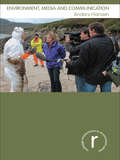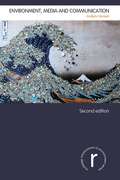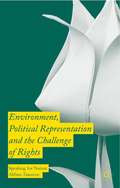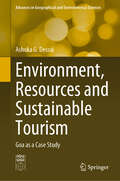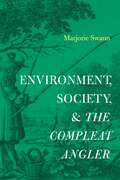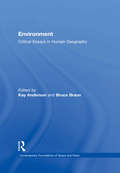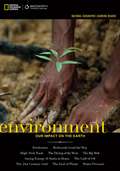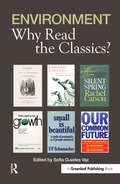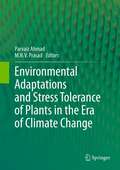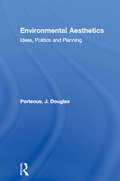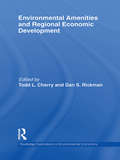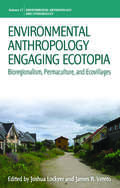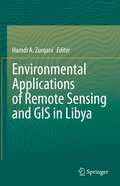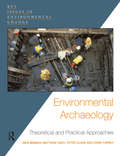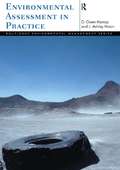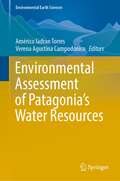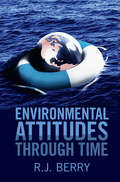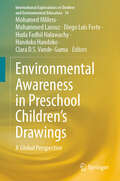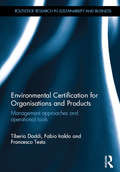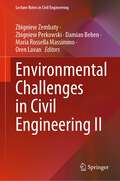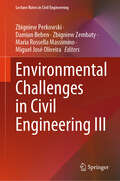- Table View
- List View
Environment, Media and Communication
by Anders HansenCommunication about ‘the environment’ in and through a broad array of news, advertising, art and entertainment media is one of the major sources of public and political understanding of definitions, issues and problems associated with the environment. Environment, Media and Communication examines the social, cultural and political roles of the media as a public arena for images, representations, definitions and controversy regarding the environment. The book starts by discussing and outlining a framework for analyzing media and communication roles in the emergence of the environment and environmental problems as issues for public and political concern. It proceeds to examine who and what drives the public agenda on environmental issues, addressing questions about how governments, scientists, experts, pressure groups and other stakeholders have sought to use traditional as well as newer media for promoting their definitions of the key issues. The media are not merely an open public arena or stage, but rather themselves a key gate-keeper and influence in the process of communicating about the environment: the role of news values, organizational arrangements and professional practices, are thus examined next. Recognizing the importance of wider popular culture narratives to public understanding and communication about the environment and nature, the book proceeds with a discussion of the messages and moral tales communicated about the environment, science and nature in a range of media, including film and advertising media. It shows how this wider context provides important clues to understanding the successes and failures of selected environmental issues or campaigns. The book finishes with an examination of the key approaches and models used for understanding how the media influence and interact with public opinion and political decision-making on environmental issues. Offering a comprehensive introduction to theoretical approaches and models for the study of media and communication roles regarding the environment, and drawing on empirical research evidence and examples from Europe, America, Australia and Asia, the book will be of interest to students in media/communication studies, geography, environmental studies, political science and sociology as wll as to environmental professionals and activists.
Environment, Media and Communication (Routledge Introductions to Environment: Environment and Society Texts)
by Anders HansenMedia and communication processes are central to how we come to know about and make sense of our environment and to the ways in which environmental concerns are generated, elaborated, manipulated and contested. The second edition of Environment, Media and Communication builds on the first edition’s framework for analysing and understanding media and communication roles in the politics of the environment. It draws on the significant and continuing growth and advances in the field of environmental communication research to show the increasing diversification and complexity of environmental communication. The book highlights the persistent urgency of analysing and understanding how communication about the environment is being influenced and manipulated, with implications for how and indeed whether environmental challenges are being addressed and dealt with. Since the first edition, changes in media organisations, news media and environmental journalism have continued apace, but – perhaps more significantly – the media technologies and the media and communications landscape have evolved profoundly with the continued rise of digital and social media. Such changes have gone hand in hand with, and often facilitated, enabled and enhanced shifting balances of power in the politics of the environment. There is thus a greater need than ever to analyse and understand the roles of mediated public communication about the environment, and to ask critical questions about who/what benefits and who/what is adversely affected by such processes. This book will be of interest to students in media/communication studies, geography, environmental studies, political science and sociology as well as to environmental professionals and activists.
Environment, Political Representation and the Challenge of Rights: Speaking For Nature
by Mihnea TanasescuTanasescu examines the rights of nature in terms of its constituent parts. Besides offering a thorough theoretical grounding, the book gives a first detailed overview of the actual cases of rights for nature so far. This is the first comprehensive treatment of the rights of nature to date, both analytically and in terms of actual cases.
Environment, Resources and Sustainable Tourism: Goa as a Case Study (Advances in Geographical and Environmental Sciences)
by Ashoka G. DessaiThis book suggests sustainable economy from the viewpoint of tourism fostering low carbon footprint. Focussed on conserving heritage, culture and endemic biota of a crucial biodiversity hotspot of the world, the book discusses the impact of a large population, fast-paced development and excessive consumption of earth resources by tourism in a developing economy. The book (i) assesses the impact of overexploitation of earth resources on environmental components such as air, water, land and people, (ii) examines the sustainability of tourism on the physical, economic and socio-cultural environment including human lifestyles, (iii) presents the potential of tourism in promoting sustainable development, poverty alleviation and conservation of nature and (iv) formulates recommendations for tourism, fostering sustainable development in Goa, India. The book offers students, researchers, academics and professionals a comprehensive discourse integrating geological and societal perspectives on core issues. It generates critical thinking on the complex issue of sustainable tourism by providing in-depth perspective on peoples of different hues and their role in safeguarding the future of this unique region.
Environment, Society, and The Compleat Angler (Cultural Inquiries in English Literature, 1400–1700)
by Marjorie SwannFirst published in 1653, The Compleat Angler is one of the most influential environmental texts ever written. Addressing a politically and religiously polarized nation devastated by warfare, disease, ecological degradation, and climate change, Izaak Walton’s famous fishing treatise stages a radical thought experiment: how might humanity’s enhanced relationship with the natural world generate a new kind of sustaining—and sustainable—social order beyond the traditional boundaries of the church, the state, and the biological family?Challenging the current scholarly consensus that reads Walton’s how-to manual as a conservative polemic camouflaged by fishlore, Marjorie Swann examines this richly complicated portrayal of the natural world through an ecocritical lens and explores other neglected aspects of Walton’s writings, including his depictions of social hierarchy, gender, and sexuality. In the process, Swann analyzes a host of noncanonical environmental texts and provides a groundbreaking reappraisal of Charles Cotton’s “Part II” of The Compleat Angler. This study extends the hydrological turn in early modern ecocriticism and demonstrates how, as a genre, angling manuals provide new insights into the environmental, cultural, social, and literary history of early modern England.Taking its place alongside landmark works of ecocriticism such as Green Shakespeare and Milton and Ecology, this fresh and timely reassessment of The Compleat Angler rightly ranks Izaak Walton among the most important environmental writers of the early modern era.
Environment: Critical Essays in Human Geography (Contemporary Foundations of Space and Place)
by Bruce BraunSpanning cultural and political ecology, the political economy of the environment, humanistic landscape interpretation, cultural studies of nature, and science and technology studies, this volume is the definitive guide to environmental studies in Human Geography over the past 30 years. The articles collected capture conceptual developments in the field for audiences within and beyond Geography, and illustrate the diversity and remarkable vitality of geographical research on society-environment relations.
Environment: Our Impact on the Earth
by National Geographic LearningThis book covers many issues regarding the planet and humans' contributions to its environmental issues and discusses ways that humans are trying to preserve the planets resources and species, find new ways to recycle those resources, and help each other. .
Environment: The Science Behind the Stories
by Jay Withgott Matthew LaposataEnvironment: The Science Behind the Stories 6th Edition, AP Edition.
Environment: The Science Behind the Stories - AP Edition
by Jay Withgott Matthew LaposataEnvironment: The Science behind the Stories is known for its student-friendly narrative style, its integration of real stories and case studies, and its presentation of the latest science and research. With the 7th Edition, engaging new features will open your eyes to environmental issues. The text makes it easy for you to see the data with new infographic-style illustrations, see connections between the case studies and your own life with new local connections activities, and see potential solutions with new success stories features.
Environment: Why Read The Classics?
by Sofia Guedes VazEnvironment: Why Read the Classics? presents six important essays by some of the world's leading environmental thinkers on six of the most emblematic books ever written on the environment. The books – Walden; A Sand County Almanac; Small is Beautiful; Silent Spring; The Limits to Growth; and Our Common Future – taken together have been hugely important in the development of global environmental awareness, activism and policy. The essayists – Viriato Soromenho-Marques, J. Baird Callicott, José Lima Santos, Tim O'Riordan, Satish Kumar and Marina Silva – invite readers to reflect on these ground-breaking works and examine their historical importance, as well as what they should mean to us today and what relevance they will have to future generations. More than just books about the environment, these are also philosophical treatises, in that they increase our understanding of the natural world and of ourselves, calling us "to weigh and consider", as Bacon put it. In particular, they make us reflect on the need to constantly redefine the purposes of progress, the economy and society. How we relate to nature is a crucial aspect in the plans we make as a species, and as individuals; and every one of these books inspires a more respectful relationship, both with nature and humanity, and consequently with ourselves. The six essays in this book are the result of a series of conferences organised in Lisbon by the Calouste Gulbenkian Foundation with the support of the American Embassy in Portugal. Its *raison d'être* was to revisit the ideas that have shaped the environmental movement, seeking inspiration to deal with what looks like a very challenging future. The significance of such timeless concepts is now more apparent than ever; and these evergreen books are full of ideas that retain their spark even in our difficult times. This is what makes them classics. Environment: Why Read the Classics? is a provocative book and will be essential reading for all those concerned about the state of the world.
Environmental Adaptations and Stress Tolerance of Plants in the Era of Climate Change
by Parvaiz Ahmad M.N.V. PrasadClimate change is a complex phenomenon with a wide range of impacts on the environment. Biotic and abiotic stress are a result of climate change. Abiotic stress is caused by primary and secondary stresses which are an impediment to plant productivity. Prolonged exposure to these stresses results in altered metabolism and damage to biomolecules. Plants evolve defense mechanisms to withstand these stresses, e.g. synthesis of osmolytes, osmoprotectants, and antioxidants. Stress responsive genes and gene products including expressed proteins are implicated in conferring tolerance to the plant. This volume will provide the reader with a wide spectrum of information, including vital references. It also provides information as to how phytoconstituents, hormones and plant associated microbes help the plants to tolerate the stress. This volume also highlights the use of plant resources for ameliorating soil contaminants such as heavy metals. Dr. Parvaiz is Assistant professor in Botany at A.S. College, Srinagar, Jammu and Kashmir, India. He has completed his post-graduation in Botany in 2000 from Jamia Hamdard New Delhi India. After his Ph.D from the Indian Institute of Technology (IIT) Delhi, India in 2007 he joined the International Centre for Genetic Engineering and Biotechnology, New Delhi. He has published more than 20 research papers in peer reviewed journals and 4 book chapters. He has also edited a volume which is in press with Studium Press Pvt. India Ltd., New Delhi, India. Dr. Parvaiz is actively engaged in studying the molecular and physio-biochemical responses of different plants (mulberry, pea, Indian mustard) under environmental stress. Prof. M.N.V. Prasad is a Professor in the Department of Plant Sciences at the University of Hyderabad, India. He received B.Sc. (1973) and M.Sc. (1975) degrees from Andhra University, India, and the Ph.D. degree (1979) in botany from the University of Lucknow, India. Prasad had published 216 articles in peer reviewed journals and 82 book chapters and conference proceedings in the broad area of environmental botany and heavy metal stress in plants. He is the author, co-author, editor, or co-editor for eight books. He is the recipient of Pitamber Pant national Environment Fellowship of 2007 awarded by the Ministry of Environment and Forests, Government of India.
Environmental Aesthetics: Ideas, Politics and Planning
by J. Douglas PorteousEnvironmental Aesthetics is a comprehensive introduction. It includes a history of aesthetics, discussing the psychology of human-environment relations, and artistic influences on the city and analysing the roles of policy and planning.
Environmental Amenities and Regional Economic Development (Routledge Explorations In Environmental Economics Ser. #21)
by Todd L. CherryEconomic development and the environment are presumed to be in conflict, but the latter part of the twentieth century experienced a series of economic changes that increasingly questioned this view. Economic activity became more footloose and the ability to attract productive labor became a prominent regional development concern. Consequently, environmental amenities began to have a larger role in determining the patterns of regional growth and development, and subsequently moved to the forefront of current regional economic development thought and practice. Environmental amenities provide non-pecuniary benefits to area residents, and induce in-migration flows to regions that possess high levels of environmental amenities. The attraction is particularly strong for those individuals with higher incomes and wealth. The combined forces of increased demand for environmental amenities and increased spatial flexibility of production has brought environmental amenities to the forefront of current regional economic development thought and practice. Regional economic development policy needs to consider the tradeoffs of attracting firms or people, which requires an understanding of the role the environment plays directly or indirectly in attracting firms and households. This book presents key papers that explore the role of the natural environment in regional economic development. The papers contain critical insights and information for both researchers and practitioners interested in the nexus between environmental amenities and regional economic growth and development. The book covers varied dimensions of this issue, including: the relative importance of amenities in recent variation in regional growth; the role of local infrastructure in promoting amenity-led development; socio-economic distribution concerns and sustainability of amenity-based growth; and the effects of local environmentally protected areas on other economic activities. This book will be of most value to practitioners and academics, specifically related to the areas of environmental economics, regional economic development, local and regional planning, public administration and public policy.
Environmental Anthropology Engaging Ecotopia
by Joshua Lockyer James R. VetetoIn order to move global society towards a sustainable "ecotopia," solutions must be engaged in specific places and communities, and the authors here argue for re-orienting environmental anthropology from a problem-oriented towards a solutions-focused endeavor. Using case studies from around the world, the contributors-scholar-activists and activist-practitioners- examine the interrelationships between three prominent environmental social movements: bioregionalism, a worldview and political ecology that grounds environmental action and experience; permaculture, a design science for putting the bioregional vision into action; and ecovillages, the ever-dynamic settings for creating sustainable local cultures.
Environmental Applications of Digital Terrain Modeling (Analytical Methods in Earth and Environmental Science)
by John P. WilsonA digital elevation model (DEM) is a digital representation of ground surface topography or terrain. It is also widely known as a digital terrain model (DTM). A DEM can be represented as a raster (a grid of squares) or as a vector based triangular irregular network (TIN). DEMs are commonly built using remote sensing techniques, but they may also be built from land surveying. DEMs are used often in geographic information systems, and are the most common basis for digitally-produced relief maps. The terrain surface can be described as compromising of two different elements; random and systematic. The random (stochastic) elements are the continuous surfaces with continuously varying relief. It would take an endless number of points to describe exactly the random terrain shapes, but these can be described in practice with a network of point. It is usual to use a network that creates sloping triangles or regular quadrants. This book examines how the methods and data sources used to generate DEMs and calculate land surface parameters have changed over the past 25 years. The primary goal is to describe the state-of-the-art for a typical digital terrain modeling workflow that starts with data capture, continues with data preprocessing and DEM generation, and concludes with the calculation of one or more primary and secondary land surface parameters. Taken as a whole, this book covers the basic theory behind the methods, the instrumentation, analysis and interpretation that are embedded in the modern digital terrain modeling workflow, the strengths and weaknesses of the various methods that the terrain analyst must choose among, typical applications of the results emanating from these terrain modeling workflows, and future directions. This book is intended for researchers and practitioners who wish to use DEMs, land surface parameters, land surface objects and landforms in environmental projects. The book will also be valuable as a reference text for environmental scientists who are specialists in related fields and wish to integrate these kinds of digital terrain workflows and outputs into their own specialized work environments.
Environmental Applications of Remote Sensing and GIS in Libya
by Hamdi A. ZurqaniThis book addresses the environmental challenges that Libya and similar countries in the regions are currently facing. Each chapter of this book provides a methodology using remote sensing (RS) and geographical information systems (GIS) dealing with one of these environmental challenges such as monitoring and mapping soil salinity and prediction of soil properties, monitoring and mapping of land degradation, spatiotemporal land use/cover, agricultural drought monitoring, hydrological applications such as spatial rainfall distribution, surface runoff, geo-morphometric analysis, flood hazard assessment and mapping, hydrologic and hydraulic modeling, pollution hazard assessment, and climate-related geophysical processes. This book also assesses the impacts of climate change on natural resources using both RS and GIS, as well as other applications, covering different parts of Libya. This book is beneficial for graduate students, researchers, policy planners, and stakeholders in Libya as well as other countries that share similar environmental issues. Also, the methodologies followed in the book's chapters can be applied to any other regions around the world with similar landscapes and climatic conditions.
Environmental Archaeology: Theoretical and Practical Approaches (Key Issues in Environmental Change)
by Peter Clark Chris Turney Matthew Canti Nick BranchEnvironmental Archaeology: Theoretical and Practical Approaches outlines and assesses the various methods used to reconstruct and explain the past interaction between people and their environment. Emphasising the importance of a highly scientific approach to the subject, the book combines geoarchaeological, bioarchaeological (archaeobotany and zooarchaeology) and geochronological information and examines how these various aspects of archaeology may be used to enhance our knowledge and understanding of past human environments. Drawing from both the practical experiences of the authors and cutting-edge research, Environmental Archaeology: Theoretical and Practical Approaches is a valuable contribution to the subject. It will be essential reading for students and professionals in archaeology, geography and anthropology.
Environmental Assessment in Practice (Routledge Environmental Management)
by Owen Harrop Ashley NixonThis text explains what constitutes good practice in applying environmental assessment as an environmental management tool. A wide range of case studies and other student text features are employed to demonstrate how the different methods, techniques and disciplines of environmental assessment can be used. The authors address the key concepts for environmental assessment procedures: methods for using E.A.; techniques for impact prediction and evaluation; environmental risk assessment; EA consultation and participation; project management; environmental statement review and post-project analysis; and strategic environmental assessment.Worldwide case studies include: gas pipelines, hydroelectric power plants, gold mining, river crossings, waste-to-energy plants and gravel extraction in England, Scotland, Ireland, Canada, the USA, Venezuela, the Netherlands, Iceland, Zambia, Zimbabwe, South Africa and Ghana.
Environmental Assessment of Patagonia's Water Resources (Environmental Earth Sciences)
by Américo Iadran Torres Verena Agustina CampodonicoThis book presents contributions devoted to the hydrogeochemical characterization of aquatic environments of Patagonia, including those of Ushuaia city, known as "The southernmost city in the world". Patagonia (between 39° and 55° S) is located in southern South America. Eight main river systems pour their waters into the SW Atlantic Ocean. Rivers, with their headwaters mainly located in the Andes, supply dissolved and particulate matter to the coastal zone, as well as nutrients, which benefit biological communities. Besides, freshwater in this region with little anthropogenic impact supports human life and a high wildlife biodiversity. Unfortunately, the recent increase in human activities, such as the use of fertilizers, wastewater discharges, extensive deforestation and dam construction, is affecting the quality and quantity of water resources. The book is of interest for researchers, professors and government agencies that decide on water resources management policies.
Environmental Attitudes Through Time
by R. J. BerryOur attitudes to our environment are widely and often acrimoniously discussed, commonly misunderstood, and will shape our future. We cannot assume that we behave as newly minted beings in a pristine garden nor as pre-programmed automata incapable of rational responsibility. <P><P>Professor Berry has studied nature-nurture interactions for many years, and also been involved with many national and international decision making bodies which have influenced our environmental attitudes. He is therefore well-placed to describe what has moulded our present attitudes towards the environment. <P>This book presents data and concepts from a range of disciplines - genetic, anthropological, social, historical and theological - to help us understand how we have responded in the past and how this influences our future. Beginning with a historical review and moving forwards to current conditions, readers will reach the end of this volume more capable and better prepared to make decisions which affect our communities and posterity.<P> Accessibly written, requiring no specific background knowledge of the reader.<P> Suggests actions the reader can take at both an individual and societal level.<P> Provides the historical context necessary to rise above the propaganda and vested interests which dominate current environmental debate.
Environmental Awareness in Preschool Children’s Drawings: A Global Perspective (International Explorations in Outdoor and Environmental Education #14)
by Mohamed Mliless Mohammed Larouz Diego Luis Forte Huda Fadhil Halawachy Handoko Handoko Clara D. S. Vande-GumaThis edited volume investigates multiple perspectives of environmental meaning-making among children by evaluating preschool children’s drawings on the environment. It critically traces the formation of early attitudes towards the environment before children’s exposure to formal environmental education. Similarities and differences are explored among preschool children's drawings across diverse cultural and geographic backgrounds. Over five sections covering Morocco, Indonesia, Nigeria, Iraq, and Argentina, each one examines the factors affecting children's environmental drawings, such as age, gender, and geography. Using different theoretical frameworks, the chapters are written by researchers of environmental discourse and ecolinguistics with a background knowledge in environmental studies from a social science perspective. This book is of interest to researchers interested in ecolinguistics and socio-semiotics fields of study. This seminal book also paves the way for further research on preschool environmental education.
Environmental Biotechnology and Cleaner Bioprocesses
by Eugenia J. Olguín, Gloria Sánchez, Elizabeth HernándezAs we enter a new millennium, the environmental issues faced by both developing and industrialised nations are as pressing as ever. Environmental biotechnologies are increasingly being viewed as a major weapon against environmental damage. Cleaner production is part of this strategy and yet there is still widespread ignorance about this emerging technology. Environmental Biotechnology and Cleaner Bioprocesses provides this information at various levels, from introductory to advanced. The first section covers the development of cleaner bioprocesses within the framework of sustainable development. Aspects of environmental policy for small and medium businesses are then discussed using case studies to illustrate principles. The second section covers the recycling and treatment of organic waste, including the use of aquatic plants and microalgae for wastewater treatment and recovery of nutrients. Section three covers bioremediation technologies and finally, section four is dedicated to emerging cleaner bioprocesses and environmentally sound products. All chapters have been written and edited by leading authorities in the field. Students and professionals interested in environmental biotechnology and cleaner production will find the background information and detail they require in this one convenient source.
Environmental Certification for Organisations and Products: Management approaches and operational tools (Routledge Research in Sustainability and Business)
by Francesco Testa Tiberio Daddi Fabio IraldoEnvironmental certification is an effective tool for managing the environmental impact of companies, leveraging their competitive capabilities and ensuring their compliance with environmental principles. A growing number of countries across the world are adopting this practice and the growth of new environmental standards – with different scopes, aims and roles – calls for a clear and updated systematization of the issue. This book provides a comprehensive, up-to-date overview of the different environmental certification tools. As well as examining practical methods of implementing the standards for each type of certification, the book discusses their added value from a corporate management perspective. In identifying the most important requirements and standards for the issuing of environmental certification of both products and processes, the book demonstrates how companies can use operational methods to develop an environmental management system or a product certification in practice. Balancing a complete theoretical presentation of the issue with an operational perspective, the book supports the adoption and implementation of environmental certification tools. It will be a valuable resource for professionals as well as students and scholars of environmental management, sustainable business and corporate social responsibility.
Environmental Challenges in Civil Engineering II (Lecture Notes in Civil Engineering #322)
by Oren Lavan Zbigniew Zembaty Damian Beben Zbigniew Perkowski Maria Rossella MassiminoThis book gathers a selection of papers presented at the 5th International Scientific Conference “Environmental Challenges in Civil Engineering”, ECCE 2022, held on September 26-28, 2022, in Opole, Poland. Written by an international group of experts, it reports on findings concerning structural material behavior, and new methods and technologies in constructions. A special emphasis is given to sustainable constructions practices, including material recycling and reuse, renovation and restoration of historical building and to those fostering sustainable development of cities and rural areas, and a better integration of buildings with the environment. Offering a good balance of theory and practice, and covering both technical and organizational aspects in civil engineering and architectural projects, this book offers extensive information on solutions and current challenges in construction projects and structural interventions in the context of environmental protection and earthquake prevention.
Environmental Challenges in Civil Engineering III (Lecture Notes in Civil Engineering #615)
by Zbigniew Zembaty Damian Beben Zbigniew Perkowski Maria Rossella Massimino Miguel José OliveiraThis book gathers a selection of papers presented at the 6th International Scientific Conference “Environmental Challenges in Civil Engineering”, ECCE 2024, held on April 22–24, 2024, in Opole, Poland. Written by an international group of experts, it reports on findings concerning structural material behavior, and new methods and technologies in constructions. A special emphasis is given to sustainable constructions practices, including material recycling and reuse, renovation and restoration of historical building and to those fostering sustainable development of cities and rural areas, and a better integration of buildings with the environment. Offering a good balance of theory and practice, and covering both technical and organizational aspects in civil engineering and architectural projects, this book offers extensive information on solutions and current challenges in construction projects and structural interventions in the context of environmental protection, earthquake prevention and sustainable urban planning.
